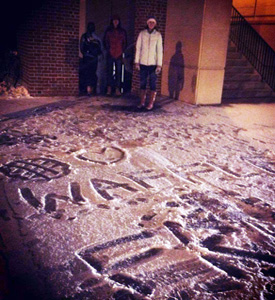by Lauren Heywood
I sat with the leaders of three Christian groups on our college campus and listened to their airing of grievances. As my interest waned, the topic suddenly changed, and a sophomore from my group piped up, “I want to reach out to the Greek life community.”
A junior from a different group asked, “What if we give out food late at night when people are walking between parties?” Murmurs broke out and heads began to shake. Someone said, “Who has time to start a new ministry?”
Silence.
As I looked around, I was surprised to hear my voice, “I will!”
I was a sophomore and a new (inexperienced) leader in the Navigators, one of the smallest interdenominational Christian groups on campus. I sat alone at my desk after the meeting, head in my hands, and asked myself what I had been thinking. We had committed to begin in two weeks, and I had nothing—no volunteers, no waffle irons, no money and no precedent.
Ministry of waffles
So I prayed with Mary Scott, my fellow Navigator, and the call began to take shape as we talked with our peers.
“We’ll do waffles!”
“With a waffle iron right there on the sidewalk!”
“At midnight!”
“And we’re not going to ask anything of anyone—this is unconditional gospel love, in a waffle.”
I visited churches and fellowships on and off campus, asked for contributions and gave speeches about our mission. I faced groups who thought it was too Christian, too secular, too idealistic and everywhere in between. I got laughs, suspicions, refusals and encouragement. The people who I expected to support the plan refused, and those who I expected to act with indifference surprised me with their instant enthusiasm.
And, as I prayed and spoke, I realized a “theology of waffles” was forming within me. I was called to gather Christians from every fellowship to give a free waffle, no questions asked, to whoever walked by. We would serve our campus community—notorious for heavy drinking and Greek life—where they were.
We would get out of the chapel and the auditorium to serve and talk to our peers where they were. And we would do so as one body, not under the auspices of any one Christian fellowship. We would act out Christ’s love as one body, without beating anyone over the head with the gospel. No, we would let the action of gospel love; that is, unconditional, surprising love, speak for itself.
Answer to prayer
 In answer to our prayers, supplies, money and volunteers poured in. One of our mentors Benny helped me to raise energy and support among the local churches. The first night, two weeks after the first meeting, a Christian a cappella group gathered with numerous volunteers to pray before we headed to frat row.
In answer to our prayers, supplies, money and volunteers poured in. One of our mentors Benny helped me to raise energy and support among the local churches. The first night, two weeks after the first meeting, a Christian a cappella group gathered with numerous volunteers to pray before we headed to frat row.
We were a large, unlikely group of pilgrims, straggling forth to be Christ’s hands as strangers with ladle, waffle iron, and cries of “Free waffles!” I set up my waffle iron, and as the group sang, a crowd began to gather, eating waffles, talking, singing, asking us why we were there. Some shared stories of their experiences, good and bad, with religion, while others wanted to talk about how hard classes were, how awesome freshman year was, why their roommate was hard to live with.
One asked for a waffle, another for my theology, and another for my phone number. Most of all, we heard the surprise of our peers that anyone would be out at midnight on a Friday to serve others in the cold. One student said, “No one’s that nice. Really, what’s the catch?” Then someone called out, “Hey! Waffle people! Don’t you know you could get money for this? Why are you doing this? It doesn’t make sense!”
At that moment, something clicked for me, and I realized, “You’re right. It doesn’t make sense. The gospel doesn’t make sense. God’s love doesn’t make sense. But we’re here, God’s here, and you’re here, and somehow, with the Holy Spirit, we’re making a community out of a silly—but delicious—bit of common ground: waffles. And that’s ministry.”
Discussion questions:
1. How can you best serve the physical and emotional needs in your community, and how do those needs relate to spiritual needs?
2. Who in your community do you feel distanced from? Why do you think that is, and how can you reach out to them?
3. Has anyone ever served you in a way you didn’t expect? How did that make you feel?
Closing prayer
Lord of unconditional love, you find us where we are and meet us there, offering us more love and life than we could ever imagine. Help us to turn again, confident in your abiding presence, and share your surprising love with those around us. In the name of your Son, Jesus Christ. Amen.
Lauren Heywood, a graduate of Dartmouth College, Hanover, N.H., is a first year master of divinity student at Lutheran Theological Seminary, Philadelphia. She is exploring a call to ordained ministry in the urban church.


You go girl! Your philosophy of service and hospitality will carry Jesus’s Gospel far and wide!
What a wonderful commitment from you and others to do this. A great way to be there for people who could use a hot meal and a lending ear to ear to what they have to say.
What a creative idea! I love waffles but don’t often make them. I used to make them for my older brother. My husband’s dad made them nearly every Sunday when he was growing up. Now I am thinking about places I might serve waffles. What an “aha” moment to realize that the gospel and God’s love don’t make sense and as part of God’s kingdom our ideas and projects don’t have to make sense to the world. Thank you for sharing your story!
God works through those who say, “I will!”
You go, Lauren! I stumbled upon this by accident. Nice article . . . great ministry. See you in class.
This is Jesus. Thank you for the nudge to get on with life after Easter.
What a wonderful way to show Gods love. Keep it up!
Way to go, Lauren! I remember this story when you shared it last fall with the ELCA Fund for Leaders folks. 🙂
I really enjoyed reading about your waffle ministry. Two of my college students drove to Florida for Spring break, with a mission group whose purpose was to give drunk college students rides so they wouldn’t drive drunk. I was surprised about their group’s idea, but they assured me that it worked and was worthwhile. I am happy to know that the waffle ministry was similarly successful. Yay for waffles and for kind people spreading goodwill in this world!
Such a great idea and I’m so glad you shared it, Lauren. God calls us to serve, and many of us simply wait for the perfect opportunity to come to us. I’m encouraged to hear how you sought out service.
What a great story. Norwegian waffles are at the heart of my family gatherings. I make them to serve for coffee hour at church to also spread the word. Great work you are doing!! Who knew what waffles could accomoplish.
Thank you, Lauren, for your ministry and reminding me of a special ministry I participated in. When I was campus minister at UW Stout, another campus minister and I gave out muffins on Monday mornings (Monday Morning Muffins). We stood on the street corner with a kitchen cart. After the second year, I wanted to go out where the kids were instead of waiting for them to come to us. One of the church parishioners made me a cart from an old wheel chair and I went out into the center of the campus. When I started giving out more than 4 doz. muffins a week, I went to the women of the church and asked for help. By the end of the third year, the women were meeting once a month making 60 doz muffins at a time and putting them in the freezer so I could take what I needed each Monday. I was giving away 14 doz muffins each week ( the max my cart would hold). I would hear things like, “I come to school on Monday because of your muffins”, “Can I bring one to my friend?”, “You’re an angel”, and “This is the only thing I’ll have to eat today.” Like in most ministries, I was blessed so much more than anyone who got a muffin. I encourage everyone to find a ministry you can do, and let God bless you through blessing others.